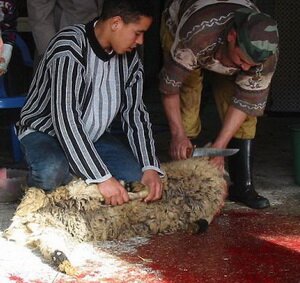
The Independent Analytical Center for Geopolitical Studies “Borysfen Intel” affords ground to the analysts generation for expressing their point of view regarding the political, economic, security, information situation in Ukraine and in the world in general, according to their personal geopolitical studies and analyses.
Note that an authors’ point of view
|
Volodymyr Guzenko — a graduate of the Military Institute of Foreign Languages (Moscow). Now Volodymyr Guzenko is in the Republic of Yemen, where he can watch one of the revolutions of the “Arab Spring” on the spot
Strongly frustrated with inefficiency of the General National Dialogue (GND), Representative of the UN Secretary General Jamal Ben Omar and Yemeni President Abdo Rabbo Mansour Hadi decided to move to methods of “true democracy” and began to issue decrees and to produce orders.
Firstly, it was decided that the last, final meeting of GND would be held on October 10 this year. Its funding stops. Secondly, the working Commission on problems of the South and building of the state (Sharia or secular) are dismissed, as such that had not coped with their tasks. Decisions on these two key issues will be approved “in exceptional working order.”
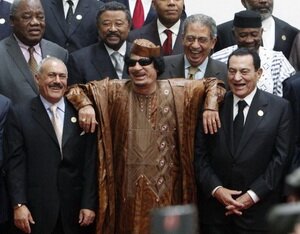 |
|
Gaddafi with Yemeni President Ali Abdullah Saleh (left) and Egyptian President Hosni Mubarak at the Afro-Arab summit in Sirte October 10, 2010 http://www.lapresse.ca/ |
A natural question arises: why has the imposed on all nations without exception American model of “democracy” not taken root in Yemen, despite the country's backwardness in all aspects? After all, the former President Ali Abdullah Saleh gave people the opportunity to express their vision of a better life, allowed to form political parties and introduced democracy as a “multi-party system”. But, as the saying goes, “it turned out as always”… Why? Best of all, in my opinion, answered this question the late Muammar Gaddafi in his “Green Book” (by the way, laid and swore by all, without exception, including the Central Committee of the Communist Party of the USSR, for its precise and clear conclusions).
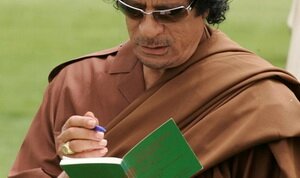 |
|
Green Book by Muammar Gaddafi http://the-legends.ru/ |
Gaddafi expressed the thought that to this day by its “sedition” makes Democrats both, in the West and in the East, sweat and shiver, “Multi-party system is a catastrophe for a state and society”. According to him, s small group of people unite into a party to protect their personal party interests, not the interests of the society and the state. Many such parties within, say, the Parliament, have to constantly conflict with each other, defending their interests. Struggle often takes any, sometimes most unexpected forms, including illegal ones. Often even most important state and public projects stop and get destroyed only because they are put forward by a party - opponent, a party - rival.
In this endless inter-party and inter-factional struggle few care about the public interest. And if one of the gets to power, all or nearly all state resources will be used to meet needs of its members, but not needs of the state. That is why Qaddafi expressed his attitude to parties in a short but succinct phrase, “Min yihzb Khan,”- “Who has joined a party is a traitor!” For a person who has joined a party, defending interests of a small group of people, thus betrays interests of the majority, that is, of the whole society.
 Download the Green Book in various formats
Download the Green Book in various formats
You, reader, may, of course, disagree with Gaddafi. Then just look more attentively at the Russian Parliament. And if you do not agree with the late Libyan leader, then God will judge. Do you not think that the role of parliaments and their many parties has been reduced to just searching for justification of decisions taken by the “rulers” and “approved” allegedly by “elected” representatives of the people?
And now let's look at Yemen. From the very beginning of this “history”, it was clear that the imposition of such a democracy on the unorganized society and state will lead to collapse. A society steeped in feudalism with some remnants of the tribal system, and at the same time trying to build a modern capitalism, and even with elements of socialism, will never reach the desired. This is what we mentioned at the very beginning of our conversation.
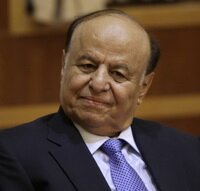 |
| Yemeni President Abd-Rabbu Mansour Hadi http://www.voanews.com/ |
The launched GND mechanism enabled the participants to simply exchange claims, to vent their complaints and, finally, to announce the threats, extremely straining the situation and bringing the country to the brink of explosion. All major components of the modern Yemeni society — tribes, political parties and movements, religious leaders, youth and women's organizations gathered on the same stage with the utopian idea — to find the perfect recipe for a just, prosperous society — in fact, merely illustrate the invention of the ugly modern democracy, called multi-party system...
At the opening of the final summing up session of the GND, President Abdo Rabbo Mansour Hadi made a speech, in which he pointed out, as the leader should do, the achievements of the GND. He did not forget about its faults-problems of the South remaining unsolved. The President announced his plans for solving this issue — a Federal Agreement will be signed between all the autonomous territories, the South included. The Agreement will take into consideration all the shortcomings and mistakes of the previous Agreement on uniting the two Yemens. It seems everything is clear; there is a plan for the future, without return to the past with its bitterness and mistakes. But the solemnity of the final meeting was completely spoiled by aggressive speeches of Southern separatists, supported by northerners — Houthis. Hot debates quickly turned into a brawl, and then grew into a banal fight. The session has not ended. It will continue after the holiday.
Note: October 16 began the Feast of Sacrifice, Eid al-Fitr, the biggest festival of the Muslim world, when every Muslim confirms his commitment to Allah, to the cause of Islam. As a rule, all leave for their villages, where lambs are slaughtered as a sign of their faithfulness. By the offering, by the way, is meant not a sheep, but their own children (just read the Bible)... Such is the psychology, inculcated since childhood. From the age of seven and on children are brought up in these traditions, learning to cut the throat of sheep and to butcher carcasses. Anyway, they get used to the flow of blood and do not faint at seeing visceras. In later years, they do not hesitate to behead captives and hostages... Such is the reality, not the myths about the “bloodthirsty Muslims”. They are not bloodthirsty; they are just trained this way. And they do it all quietly and without remorse. So we can only accept them for who they are. |
Interestingly, in parallel to the GND session, in one of the halls of the same Presidential Palace, was being held a meeting of “mini-GND” — of Special Committee “8+8” (in the press it is also called the “Committee of 16” or “reduced GND”). But this meeting was to no positive result either.
During the festival, all political activity, it would seem, should be reduced to the limit. That is what it was at first. But in fact, the “fights of bulldogs under the carpet” did not stop for a moment. They seem to just have moved to a different subspace.
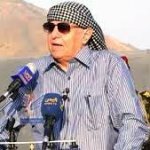 All departed. Prime Minister Basindawa went to Germany, half of his Ministers went around the world, and others rushed to their ancestral villages and estates. But one of the Ulema - theologians, sent an open letter to President Hadi with a demand to call off state employees' leave, to make all the Ministers return from abroad, because “one should not holiday, when the country is dying.”
All departed. Prime Minister Basindawa went to Germany, half of his Ministers went around the world, and others rushed to their ancestral villages and estates. But one of the Ulema - theologians, sent an open letter to President Hadi with a demand to call off state employees' leave, to make all the Ministers return from abroad, because “one should not holiday, when the country is dying.”
 President Hadi himself also left Sana'a for the island of Socotra, where he solemnly announced the creation of the new province of “Socotra Archipelago”, bringing it from under the control of Hadramawt. It was Emir of Qatar who “suggested” to create the new province. He also promised large investments into Socotra in exchange for permission to build a tomb on the island to his great-grandmother, who died during the Hajj on a ship near Socotra and was buried on the island because of the heat, that did not allow to keep the body for a long time. I do not know whether this is true or not, but that is not important. It is quite possible that Emir's request had something to do with the discovery of oil and gas fields on the continental shelf west of Socotra.
President Hadi himself also left Sana'a for the island of Socotra, where he solemnly announced the creation of the new province of “Socotra Archipelago”, bringing it from under the control of Hadramawt. It was Emir of Qatar who “suggested” to create the new province. He also promised large investments into Socotra in exchange for permission to build a tomb on the island to his great-grandmother, who died during the Hajj on a ship near Socotra and was buried on the island because of the heat, that did not allow to keep the body for a long time. I do not know whether this is true or not, but that is not important. It is quite possible that Emir's request had something to do with the discovery of oil and gas fields on the continental shelf west of Socotra.
 |
| In the bay Shuab on Socotra one can get such lobsters from the hands of a passing by fisherman http://photorabota.ru/ |
Actually, Socotra is a unique place on the Earth. One can talk about this island forever. For example, there are all those myths about the Soviet naval base, later the US' one. But this is another story, for some other time…
After a visit to Socotra, President Hadi visited Aden, where hard, at all levels, he was urging southerners to return to the GND and even, according to some reports, held a “secret” meeting with separatist leaders.
Member of the Advisory Board Dr. Abdel Wahab al-Rouhani suggested that President Hadi should “honestly declare the failure of the Dialogue, dissolve the helpless government and appoint emergency parliamentary and presidential elections... Otherwise someone else will do it by force”, for example, al-Rouhani (by the way, he is not the least in the Yemeni elite).
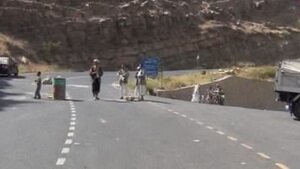 During the festival, a new form of protest of tribes was born, — a sort of civil disobedience. However, it is not clear against whom it is directed. Most likely, it all is within the framework of “destabilization”. Tribes cut the main strategic highways, not letting conventional cars and lorries through, but quickly leave when the Police arrive, who parse the logjams. And when the Police leave, the road is blocked again. Police Raids in one day removed six of these barriers on the road Sana–Sa'ada, on the road, Sana'a-Hodeida — eleven, on the road Sana'a-Taizz - eight... Quietly, without blood and fire. Outgoing columns of oil tankers heading to Hodeida are also get blocked, since the pipeline was blown up again. Badly was blocked the road Sana'a-Marib, where hundreds of tanker trucks with diesel and gasoline had accumulated.
During the festival, a new form of protest of tribes was born, — a sort of civil disobedience. However, it is not clear against whom it is directed. Most likely, it all is within the framework of “destabilization”. Tribes cut the main strategic highways, not letting conventional cars and lorries through, but quickly leave when the Police arrive, who parse the logjams. And when the Police leave, the road is blocked again. Police Raids in one day removed six of these barriers on the road Sana–Sa'ada, on the road, Sana'a-Hodeida — eleven, on the road Sana'a-Taizz - eight... Quietly, without blood and fire. Outgoing columns of oil tankers heading to Hodeida are also get blocked, since the pipeline was blown up again. Badly was blocked the road Sana'a-Marib, where hundreds of tanker trucks with diesel and gasoline had accumulated.
The Army unblocked this road, Sana's got fuel, but two days later it was blocked again, and now there are fights there. The holiday turned out “merry” indeed.
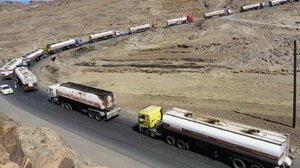 And in Sa'ada fighting again broke out between Houthis and Salafis. But about these fightings we will talk a bit later. In the meantime, we are patiently waiting for the end of the holiday, that is, October 22, and the resumption of the Dialogue. Although from my own experience and the experience of my colleagues I know that the festival will last for at least another week and the work will actually not begin before October 29-30.
And in Sa'ada fighting again broke out between Houthis and Salafis. But about these fightings we will talk a bit later. In the meantime, we are patiently waiting for the end of the holiday, that is, October 22, and the resumption of the Dialogue. Although from my own experience and the experience of my colleagues I know that the festival will last for at least another week and the work will actually not begin before October 29-30.
And finally, it is officially announced that on October 25 is appointed counter-revolution to overthrow Basindawa's government and President Hadi. Well, let's wait and we’ll see. And it will be something to think about.
However, this date gives me some vague associations.


